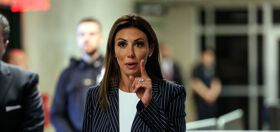
Leading up to the historic Supreme Court ruling at the end of June, Queerty will publish a regular “Countdown to Equality” series of features, from the farcical to the furious. This is the first in the series. Please submit your ideas to [email protected].
Oh, Antonin, Honey. Are you okay? You seemed to have a kind of mental fit the other day during the marriage equality oral argument.
Maybe you were frazzled by the guy in the audience who stood up to shout that the court would burn in hell for allowing marriage equality. Oh, sure, you called it “refreshing,” whatever that means, but perhaps it distracted you from the proceedings.
How else to explain your bizarre tangent about how legalizing gay marriage would force ministers to participate in gay weddings against their will?
How about we take this to the next level?
Our newsletter is like a refreshing cocktail (or mocktail) of LGBTQ+ entertainment and pop culture, served up with a side of eye-candy.
“Is it conceivable that a minister who is authorized by the State to conduct marriage can decline to marry two men if indeed this Court holds that they have a constitutional right to marry?” you asked.
Surely you know that there is zero chance of that actually happening, right? We assume that you do, but just in case you were genuinely confused yesterday, we’ve put together a few reasons why you can stop worrying so much about queers. Give it a once-over, and then try to get some rest. We’re worried about you.
1. There’s That Whole First Amendment Thing
You could not ask for a more perfectly tailor-made First Amendment case than a minister forced to officiate over a wedding that violates his or her religious beliefs. Yes, of course, there are laws that prohibit discrimination in government practices and in public accommodations (meaning, businesses that are open to the public). But there’s a super-high bar to requiring someone to violate their religious beliefs in any context, particularly in public. For example, faith healers who let their children die go to jail. But ministers are free to marry (or not marry) whoever they like. In fact, many religious official already turn down requests.
What Scalia’s probably noting here is the inherent weirdness in the blending of government and religion when it comes to solemnizing marriage. For no good reason other than tradition, faith leaders have unusual authority from the state when it comes to pronouncing people married. Scalia’s absolutely right that it is pretty weird or the state to make ministers semi-official representatives of government, with the authority to take care of forms and paperwork and legal status. Churches and states have always had an uneasy relationship, and marriage should probably be confined to one or the other, not both. But until that day comes, we’ll just have to maintain the uneasy compromise we currently enjoy
2. This is Different From the “Gay Cake” Controversies
Scalia seems to have been thinking about the recent controversies surrounding businesses that refuse to treat gay customers the same as straight customers. We’re all pretty sick of those stories by now: usually, what happens is a gay couple wants to pay for a service for their wedding, and a business owner thinks that their religion forbids them from helping gay people, and then someone sues and everyone gets upset.
At least, we think that’s what Scalia had in mind. It’s hard to say, because he so seldom makes any sense. They certainly have been in the news a lot lately, from cake-baking cases to the Indiana turn-away-the-gays law.
But this is different. Businesses that are open to the public have to follow a lot of laws that private religious officials don’t. Businesses — also known as public accommodations — can’t discriminate on the basis of things like race or gender, and in some places, sexual orientation and gender expression. If you’re conducting a religious ceremony, though, you’re not subject to those requirements. That means that a religious conservative could refuse to marry a same sex couple or even an opposite sex interracial couple. A MCC minister could refuse to marry a right-wing antigay opposite sex couple. You get the point. Those sorts of functions are not open to the public, at least not from a legal point of view; they’re private functions and they’d have to be doing something pretty freaking illegal before the government intervened and told them to stop.
3. This Simply Doesn’t Happen
Justice Kagan pointed out the obvious: nondiscrimination laws exist all across the country, and religious officials have never been compelled to obey them when conducting a wedding.
Many rabbis, for example, refuse to marry interfaith couples. That’s discrimination, but it’s perfectly legal since it’s happening within the context of a religious ceremony. And nobody is running to a lawyer’s office to sue their Rabbi for discrimination, in part because they know they’d be laughed out of court and in part because everyone agrees that even thought the bigoted view is ridiculous, you can’t ask ministers to go against their faith, absurd or not.
Of course, if a government official tried to do the same thing, we’d have quite a conflict on our hands. Imagine if a clerk said that they’d start offering different services to Jews versus Gentiles — there’d be an outcry. Well, that’s precisely what many towns and states are trying to codify with their odious “turn-away-the-gays” bills: they want to make it legal for government officials to discriminate like it’s legal for religious officials. But there’s no interest in pushing back the other way, in making religious officials perform more like neutral government officials.
Scalia did hint that maybe states would have to stop giving religious officials special powers to conduct weddings, if they’re not going to conduct them in accordance with the U.S. Constitution. To be honest, that sounds like a good idea to us; but given that religious people control virtually all aspects of government and culture, it’ll never ever happen.
4. Why Would You Want an Anti-Gay Minister at Your Wedding?
Let’s just pause for a moment to consider the obvious: if a minister really doesn’t want to conduct a wedding, why would you insist on having him there in the first place? Can you imagine the passive-aggression of the minister in question? Loud sighs, not paying attention, bungling the ceremony. Ugh.
Look, we have to assume that the demand for abusive wedding officiants is relatively low. There are probably very few gay couples who are going to approach a priest and request a service in which they are berated, told they’ll burn in hell, and have scorn heaped upon them. Sure, Roman Catholic ceremonies are punishingly long, but they’re not brutal.
The gay couples who are getting married in religious ceremonies don’t belong to anti-gay churches. They belong to churches that affirm their relationships. And so when they go to their priest (or Rabbi, or cult leader, or whatever) they already know that they’re going to get someone who approves of what they’re up to. If they belong to a church that teaches that homosexuality is a sin, well, chances are pretty good that they don’t have any plans to marry in their immediate future.
5. Scalia Can’t Seriously Believe His Own Argument
Come on. Really, Scalia? Do you really believe that ministers will either be forced to marry LGBT couples, or have their right to officiate weddings revoked?
The premise is just ludicrous on its face, so we have to assume that he doesn’t actually believe what he’s saying. So why say it, then?
Our guess: it was meant as a dog-whistle to his friends, the homophobes. Scalia, as we know, pals around with gross anti-gay folks — you know, exactly the kind of people who would like to be able to continue scare-mongering around gays coming to destroy religion. By airing this stupid hypothetical during oral argument, he was feeding a talking point to his fans, tell them why they should be so scared of gay marriage. He might also have been giving us a little preview of the arguments he’ll use in what will hopefully be a dissent from the majority opinion. Even though he probably doesn’t really believe that religious officials will be required to violate their faith, simply saying it out loud gives political cover to people like Brian Brown who have built a career on making sure people are scared of gays.
Of course, those tricks won’t work for much longer. A majority of the country supports marriage equality at this point, and the numbers will only get better. We have marriage in most of the states. And in the near future, it’ll seem like no big deal, and everyone will wonder why it was ever a problem at all.
At that point, people will look back on Scalia’s rhetoric, shake their heads, and say, “thank God we don’t have that guy around anymore.”




















Angel Perez
Why doesn’t he just die already?
Ronbo
When I got married it merely required a license and court official. Ministers are optional to the process. If you aren’t familiar with the process, you should NOT be Supreme Court Justice.
1EqualityUSA
Animus:
a usually prejudiced and often spiteful or malevolent ill will, a usually prejudiced and often spiteful or malevolent
———————————————————————————
Recuse:
challenge (a judge, prosecutor, or juror) as unqualified to perform legal duties because of a possible conflict of interest or lack of impartiality.
“a motion to recuse the prosecutor”
(of a judge) excuse oneself from a case because of a possible conflict of interest or lack of impartiality.
Matthew Chaney
He is a brilliant man, too bad religion is clouding his judgement on this matter.
Boy L Joey
unbenched that ugly fat judge ASAP
1EqualityUSA
We must never let Republicans have power again. The Supreme Court Justices that Republicans want will occupy the bench for years and years, the gift that keeps on giving. The political maneuvers that this conservative bench pulled, (Citizens United, Gutting Voter Rights Act, Hobby-Lobby,) has shaken my confidence that the highest court in the land can be fair and impartial. They have done everything in their power to politically assist Republicans. It’s blatant politics from the bench.
jason smeds
Hasn’t this Scalia guy been sitting on the Supreme Court for, like, 25 years now? I don’t think he has ever issued a pro-gay ruling in all his time there. Remember, this is the guy who voted to keep sodomy an offense when he dissented in the Lawrence vs Texas case 10 years ago, a case we won.
He appears to be highly prejudiced towards homosexuality. Maybe he fears it. Maybe he fears it in himself. It wouldn’t surprise me if he has latent homosexual feelings.
Mykaels
What Scalia forgets (and Chief Justice Roberts indicated that he was not at all aware of) is that a minister performing a wedding ceremony does not make it legal. It is the documentation that is signed by him/her that makes it legal. A clerk/judge has to sign it, the religious leader does not. They do not have to marry anyone they do not want to, and that is ok because of the first amendment, because if a couple cannot find a church, they have always been able to go to city hall. It is common for catholic priests to refuse to marry a couple who is not catholic, a rabbi to not marry non Jews. There are even Baptist ministers who refuse to marry non baptists. Even though the heterosexual couple has the right to marry.
Constitutionally allowing gays to marry will not force religious leaders to marry anyone. There is no controversy here.
1EqualityUSA
I thought it was odd that Justice Roberts wants the legalities to continue. Is he thinking that all of the political assistance given to Republicans, (Citizens United, gutting the Voting Rights Act, and HobbyLobby,) will come to fruition in the next presidential election? Why not equality? The whole enchilada. Would it be wise to give up so much? The possibility of having a Republican win in 2016 will change the Supreme Court for years to come. Why not equality? Would Justice Roberts prefer that we unpopular Americans be forced to shell out money to our cause? Less cash for political figures. This yoke around our necks is convenient for the conservatives who seek to deny us inalienable rights. Justice Roberts may try to postpone the inevitable for as long as possible, that we will be counted as 100% Americans. It’s as though we are trying to swim to shore in choppy, hate-filled, political waters, and the Supreme Court cares only for who will win the next election. Why not equality? Is this so much to ask?
MacAdvisor
@Matthew Chaney:
“He is a brilliant man, too bad religion is clouding his judgement on this matter.”
I assume the “he” in that sentence refers to Scalia. Scalia is not brilliant. He is perhaps witty and he has a dramatic flair, but being a straight drama queen does not brilliance make. One of the core aspects of a brilliant mind is it is open to new ideas and interpretations. Brilliant minds thrive on seeing the new and the different. Scalia is fixated on the old and keeping things the same. He is the Sheldon Cooper of the Supreme Court, determined to keep his spot on the Constitutional couch.
Bauhaus
@jason smeds:
“He appears to be highly prejudiced towards homosexuality. Maybe he fears it. Maybe he fears it in himself. It wouldn’t surprise me if he has latent homosexual feelings.”
Well, no shit.
And here’s another thing, Jason: show me a homophobe, and I’ll bet dollars to donuts he hates women, too. He may like SEX with them (heterosexual), but he doesn’t LIKE them. Homophobia, r@cism and misogyny, are all cut from the same cloth.
Yet, there are gay men and women, who will justify voting for republican vermin, which put men like this in position of power. After all, they figure, “I’m not a one issue voter.”
brytta
I’m gay, and I’m in favor of gay marriage, but I believe that Scalia posed a valid constitutional question that nobody here, including the writer of this article, seems to comprehend.
The CONSTITUTIONAL right of free exercise of religion allows ministers, rabbis, etc, to choose whom to service (marriage) even if its discriminatory, because religions can exercise their CONSTITUTIONAL rights to be exempt from some LAWS that violate their religious tenants. Even LAWS banning discrimination.
However, religions are forbidden from using their CONSTITUTIONAL protections to violate the CONSTITUTIONAL protections of others (they can’t claim a religious right to own slaves).
So the question Scalia raised is valid. If gays are given a CONSTITUTIONAL right to marriage, would religions be forced to participate in them, or would they be charged with CONSTITUTIONAL violations. There is a significant legal difference between being exempt from a LAW versus violating the CONSTITUTION.
Personally,I don’t think so since tradition has allowed religion to generally determine their own tenants and select whom to serve. But nevertheless, it is an important CONSTITUTIONAL question that deserves a thoughtful and legal answer.
Clark35
@Matthew Chaney: He’s Roman Catholic and older. I’m not surprised he said these things.
Celtic
Scalia is a national disgrace and an insult to the highest court in the land. He looks like he is a member of some judicial mafia.
man5996853
@brytta: Is the right to marriage and the right to marriage within a specific religious denomination the same thing? Catholic priests don’t marry gay couples in any of the states where gay marriage is currently legal nor do they have to do so. The officiant of a marriage at city hall won’t be able to deny any couple the right to marry but haven’t priests and ministers within denominations been able to discriminate as they please? I am not sure how the question he asked was in any way a legitimate one.
Celtic
As an ordained Priest, non-Roman, I can decline a request to marry anyone anytime anywhere. Clergy are NOT required by any law to perform a marriage ceremony. Justices of the Peace are not clergy, but are authorized within certain jurisdictions to perform wedding ceremonies.
Bad Ass Biker
Point # 4 – Best of the bunch and right on target. As for Scalia, he is simply another fat ass bigot who thinks he is smart but has anger problems. Maybe he and Krispy Kreme Christie are twins separated at birth. And by the way, where is Unkle Thomas? Has he said anything or is he simply sleeping through everything and waiting for Ol’ Massa Scalia to tell him how to vote?
casey
Of course, one solution is to remove any church as an agent of the State in the marriage process, as they have in some European countries. Those who wish can then have a religious ceremony after the secular ceremony.
Nohea
As a minister in a mainline Protestant denomination I am NOT required to marry any one if I choose not to for whatever reason. This is yet another lie put forward by the radical right.
brytta
@man5996853: My only point is that from a legal and constitutional perspective, Scalia’s question has merit and shouldn’t be scorned just because we don’t like him or his motives.
There is no current federal constitutional right for gay marriage, otherwise it wouldn’t be in the court now. (Actually, there’s no federal constitutional right to marriage as far as I can tell.) So any current discrimination of clergy to gay marriage is OK because it falls within their Constitutional right to religious liberty; they are not violating the Constitutional rights of others, they are Constitutionally exempt from certain non-discrimination laws.
However, when gay marriage is elevated to a Constitutional right, and I expect it will, that’s an entirely different situation. The Constitutional right of religious expression (not wanting to marry gays) could violate the Constitutional right of gay marriage. Legally, the right of religious expression can not be exercised if it violates other Constitutional protections. So perhaps it could be used to force Catholic priests to perform gay marriages if they don’t want to lose their federally recognized status as a religion.
Personally I think that it wouldn’t be that hard to find a legal and constitutional way to allow religions to continue to decide who they will or will not marry. But that doesn’t mean that the question was stupid, or that it doesn’t deserve an answer.
PRINCE OF SNARKNESS aka DIVKID
I’ll just be happy when this all over to know that Matt Baum’s skin will finally receive some sunlight and vitamin D : /
We appreciate your effort, Matt!
tricky ricky
scalia was told to say that by his anti gay priest son. plus, he’s a senile old asshole.
tricky ricky
@brytta: it was a specious question that had no merit. no preacher is ever forced to marry anyone they don’t want to nor will they ever be forced to. scalia asked it to be an asshole.
tricky ricky
@1EqualityUSA: roberts gave himself an out with the sex discrimination question. he can use it as justification for ruling pro gay marriage. it is only a small part of the argument but is just enough so that he won’t go down in history as prolonging denial of equal rights to gays.
Doughosier
It must be hard for him to try a justify his bigotry intellectually He hates us, for whatever reason and now is forced to justify it legally, which is impossible. So he’s forced to come up with arguments that he probably knows are flawed.
LubbockGayMale
Presently, Catholic priests regularly refuse to officiate at a divorced person’s second wedding, and no one is ticked off, right? And why would I ask an anti-gay religious leader or lay official to preside at my wedding? It’s a non-starter of an argument.
tricky ricky
@Doughosier: scalia is an ultra conservative old time catholic. one of his sons is a rabidly anti gay priest.
Richard
Scalia and the rest of the Gang of Five in the Supreme Court need to be removed. Especially Scalia and Thomas who have both been seen at Koch Brothers fundraisers and Thomas fundraising for his former employer, Monsanto, the company that puts insect repellants in its seeds and sues farmers for not using them.
When the Supreme Court removed a pertinent part of Section 4 of the Voters’ Rights Act, Scalia declared, “Racism doesn’t exist in this country anymore.” As the article here states, that was a notice to his pals to renew the horrible history we’ve tried so hard to bury. Jokes and not jokes and threats to President Obama increased dramatically after that and racism in general bounced back as though it had never left.
For whatever reason, we need to protest the validity of any decisions made by Scalia and Thomas because they’ve already been under investigation attending those fundraisers but, of course, nothing has come of that. They are frauds in a place where decisions should be made based on our Constitution. The article is wrong in stating that religion will be a part of our government forever. That’s one thing we absolutely need to object to because of the violation of the separation of church and state that has not been adhered to in any fashion since the Constitution was ratified.
Never be afraid to raise your voices while we still have that freedom. If the Fundamentalists have their way we’ll all be murdered anyway. So speak out every chance you get against these freaks who deliberately misinterpret Bible verses in order to have an excuse to use Biblical laws that are thousands of years old against homosexuality and women. I’m 69 years old this month and I can truly say that the younger generation had better get off its collective asses and demand their rights because those rights should never have been denied them. Why should they continue paying tax for everyone else’s privileges and still be denied. In case you haven’t been informed about the attorney in Huntington Beach, California who paid $200 to have a proposition placed on our ballots to be allowed to shoot gay people in the heads, this is what you younger folks are up against and it’s a daily routine of these hateful individuals across the nation and around the world. They are guilty of premeditated murder before committing it. The threat is out there and they are serious.
America has been seriously lacking in people standing up for their rights as of late and we are losing them one by one as the Fourth Reich builds its home in our homeland. In fact, Homeland Security is a farce because the terrorists we most need to fear are living right here in our country and they are mostly white, fake Christian (not to be confused with mainstream Christians) hater groups that are out to get anyone who doesn’t go over to their side. And that includes mainstream Christians. Good luck!
Richard
By the way, there are hundreds of churches in this country and others that are accepting of homosexuality, many of them in the mainstream.
Here is the website where you can locate them and expect to find a preacher willing to marry you.
http://www.gaychurch.org/find_a_church/
1EqualityUSA
tricky ricky, Yes. I read really interesting articles today and listened to interviews with David Boise. I didn’t get much done today. What a predicament. If they go hard-nosed and look like a pack of bigots, people will shy away from the party responsible for tapping these legal eagles. If they pull a 7 to 2 ratio, the division on the court is lessened. Removing this issue for Republicans will get more political bang for their buck. If Chief Justice Roberts does go that way, calling it discrimination on gender, irrespective of the persons’ orientation, does that lessen protections for us? If so, this may be a way of acquiescing on the vote, but giving as little recognition as possible to our being gay. Cheeky, cheeky, naughty, sneaky.
Saint Law
@tricky ricky: “one of his son’s is a rabidly anti gay priest.”
A gay rabidly anti gay priest.
Rob Schellinger
“Oh, sure, you called it â??refreshing,â? whatever that means, but perhaps it distracted you from the proceedings.”
You do know that audio of SCOTUS proceedings are readily available to anyone, right? It was a joke about the somewhat heated back and forths preceding the interruption. The joke being a suggestion that the ranting of the protester was light in comparison and provided a bit of a break. Judging by the available audio, quite a few people got it.
“because he so seldom makes any sense.”
Your article doesn’t make any sense. Stick with mindless fluff pieces on porn stars and give up your failed attempt to report on court proceedings. You suck at it and nobody interested in finding out would turn to hysterical, pearl-clutching queens.
mdhess
Justice Scalia may end up surprising us all. No doubt he is not a fan and would love to sink us but he’s also a “strict constructionist” which means he is devoted to an original interpretation of the Constitution. While he seems to show little concern for rights derived from constitutional amendments he did express sincere interest in enforcing the “full faith and credit” clause in article IV. He may well rule against us in requiring states to legalize same sex marriages but he seemed quite interested in requiring states to recognize marriages legally performed elsewhere. I could be wrong, he may let his animus overwhelm his integrity (not an uncommon court occurrence), but he could surprise us and affirm our right to have our legal marriages recognized.
GayEGO
Both Scab-lia and Thom-ass should be replaced with justices that can keep church and state separate. It is embarrassing to have these two in our justice system.
Celtic
Actually, both men should be impeached because of their breach in ethics. But, this country is dying on the limb because of the likes of Thomas, Scalia, Alito and perhaps even Roberts. They have had their secret agenda for years, and being upright, moral and ethical simply does not work within their particular social formula. Similarly, the skew the U.S. Constitution to meet their own heinous goals for this once great nation.
captainburrito
@jason smeds: He was on the side of dismissing prop 8 due to standing which let gay marriage in California resume. That was only because he feared that if the majority considered the merits they would have legalized gay marriage nationwide. And thus he’d rather lose California (which would have gay marriage by legislature or ballot soon anyway) than lose the whole nation.
captainburrito
@mdhess: FF&C does not require other states to recognize marriages from out of state. If the gay marriage bans themselves are not brought down, case law does not support recognition of out of state marriage licences.
Clark35
@Celtic: Typical bigoted remark from someone who hates Italian people and Italian-Americans.
Celtic
REALLY? REEEEALLLY? Is that your best shot? You are one very thin-skinned soul who can only go on attack mode because of your diminished intellectual capacity. You assault someone with a sweeping judgment, which by the way is quite wrong and way off base. So, take a deep breath, relax and have some more pablum. I dislike Scalia because he represents the negative for the Court AND for the many Italians I know and have known throughout my life.